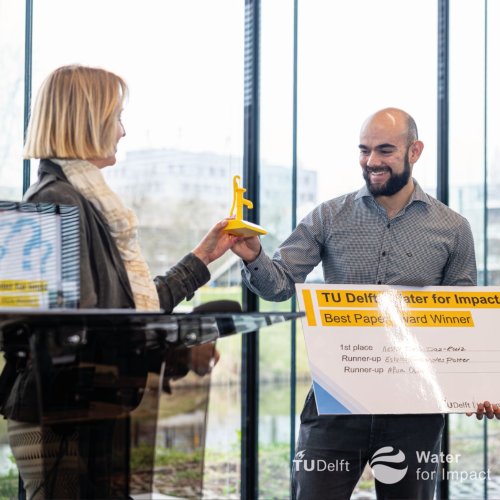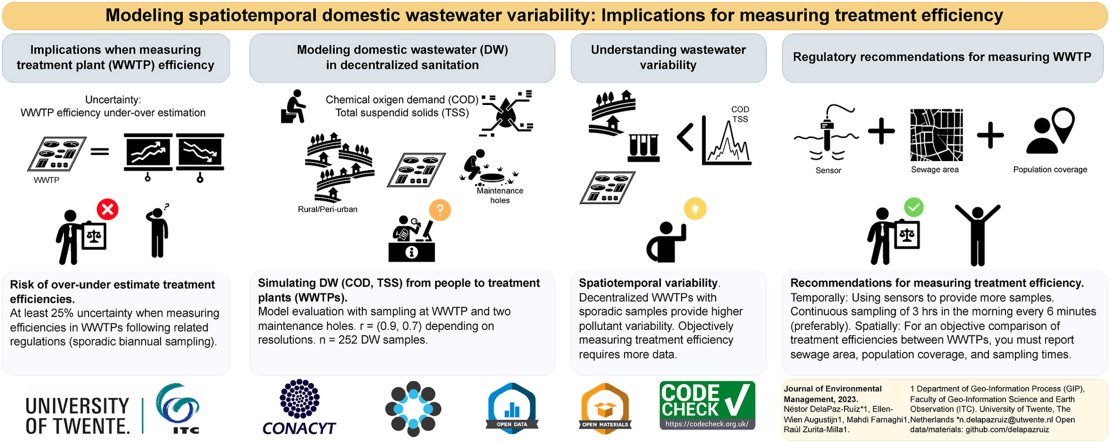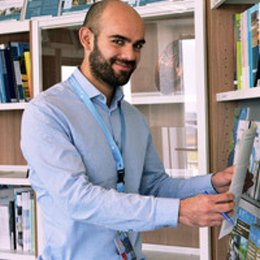Last week, PhD candidate Néstor de la Paz Ruíz, supervised by Dr. Ellen-Wien Augustijn, Dr. Mahdi Farnaghi, and prof.dr. Raúl Zurita Milla of the department of Geo-information Processing (GIP), won the Best Paper Award at TU Delft - Water for Impact.

His manuscript is entitled ‘Modelling spatiotemporal domestic wastewater variability: Implications for measuring treatment efficiency’ and the motivation arises from an experience when assessing the efficiency of decentralized treatment sanitation in Mexico (linked to monitoring the SDG 6.3.1 indicator). In this experience, he witnessed the wrong assumption that measuring treatment efficiency is as trivial as using a single sample from the inflow and outflow of treatment plants to define the percentage of pollutants removed from wastewater.
His research presents a validated model showing the significant uncertainties of (under)overestimating the treatment efficiencies. Through spatiotemporal modelling, he studied the variability of domestic wastewater at multiple resolutions. The findings allowed him to provide general recommendations to report treatment efficiencies for an objective and standardized comparison between treatment plants. He considers his findings beneficial in improving monitoring methods (the SDG 6.3.1 indicator) and are applicable in the global south and developing countries. If we do not objectively monitor how efficient our treatment plants are across time and space, we cannot take action to improve sanitation.
His research has a transdisciplinary flavour and follows open science practices. The study was co-developed with the support of the municipal authorities, citizens, and local technicians, and it is reflected in the problem statement and data collected. It required combining qualitative and quantitative approaches while considering the gaps in sanitation policies, developing modelling methods, and quantifying spatiotemporal resolutions. We also promote open science by sharing our model and materials.

More recent news
 Thu 19 Feb 2026Project SEEN‑ATLAS Receives European Funding
Thu 19 Feb 2026Project SEEN‑ATLAS Receives European Funding Wed 18 Feb 2026Master's in Geo-information Science and Earth Observation recognised as an initial Master's
Wed 18 Feb 2026Master's in Geo-information Science and Earth Observation recognised as an initial Master's Wed 18 Feb 2026Prototype 'digital twin' helps Enschede better predict groundwater
Wed 18 Feb 2026Prototype 'digital twin' helps Enschede better predict groundwater Thu 12 Feb 2026Calisto Omondi 500th PhD graduate
Thu 12 Feb 2026Calisto Omondi 500th PhD graduate Tue 10 Feb 2026IPBES report: businesses cannot survive without nature
Tue 10 Feb 2026IPBES report: businesses cannot survive without nature


